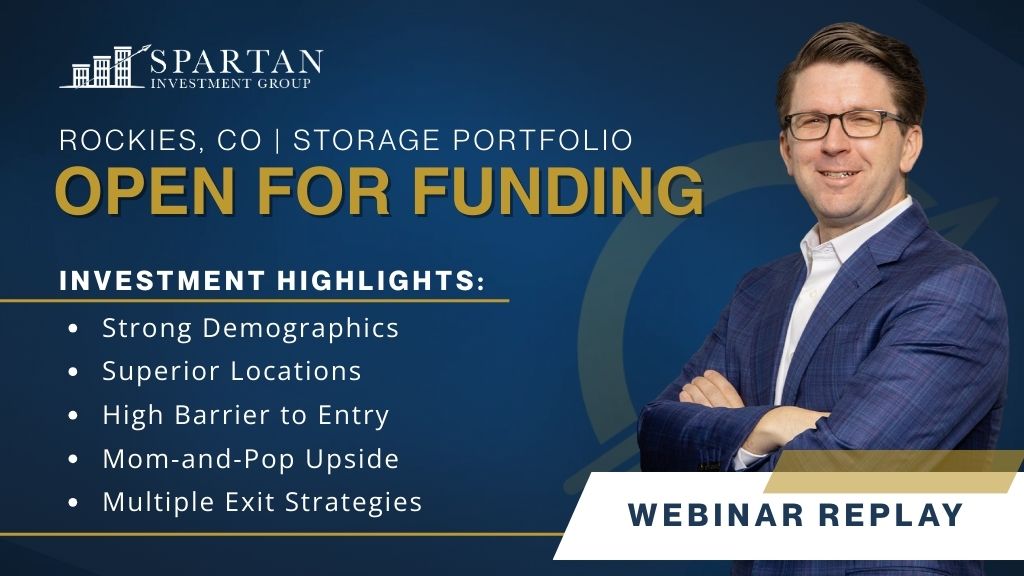How to Scale Your Passive Investment Portfolio

Since our founding in 2014, Spartan Investment Group has operated with the goal of scaling our commercial real estate portfolio in mind. Today, Spartan has invested in over 50 self-storage assets across the country worth over $500 million.
What are the keys to our success? In this blog, we break down the steps we used to expand our business and share how you can achieve the same within your investment portfolio.
Get Clear On Your Objectives
Before investing in any opportunity, it’s important to define your lifestyle and financial objectives. Having a set of clearly defined objectives will help you better understand how to identify opportunities that will help you achieve your goals.
Start by asking yourself the following questions:
- Why am I doing this?
- What do I want to achieve?
- What am I willing to sacrifice?
Use the answers to these questions to establish your strategy—active, passive or both—and guide your investment thesis. An investment thesis should outline the specific types of asset classes, markets, etc. you want to invest in, helping you easily say no to opportunities that don’t align with your objectives.
A mission, vision and values framework is another tool that ensures you stick to the financial goals you’ve identified. Whether you decide to be a passive or active investor, this framework will help provide clarity when faced with unique challenges.
Spartan Tip: If you’re a syndicator building a business with little experience, consider writing a strategic plan to communicate your objectives, investment thesis, and mission, vision and values framework. Having all of this information in one place can help you secure capital and gain investor confidence early on when you don’t have a huge book of business.
Build Your Team
Whatever investment strategy you decide to take on, building a strong team of commercial real estate experts is essential to achieving success as you scale your portfolio.
Your CRE dream team should include the following:
- Tax Advisor/Certified Public Accountant (CPA) — Having a tax advisor or CPA on board will ensure you’re keeping up with changing tax codes and adjusting your tax strategy along the way.
- General/Legal Counsel — A legal expert is a great resource to have on your team as you review offering documents and subscription agreements.
- IRA Custodian — An IRA custodian can help you answer questions about how investors can set up their accounts, manage their funds and see tax benefits.
- Insurance Provider — Insurance is always the first line of defense in any unforeseen incident or lawsuit.
- Business Coach/Mentor — Whether paid or unpaid, find somebody that’s done this before who you can trust to give sound advice.
- Estate Planning Professional — This expert can help you develop a plan to ensure your assets don’t wind up in legal limbo if something unexpected occurs.
How do you find your team? There are several ways to find experts outside of doing research online. Some of the easiest ways to build your team are to attend networking conferences and join syndication groups—both are great ways to meet like-minded investors who can recommend and connect you with their service providers.
The process may be slow and challenging at first, but you are likely to meet more and more professionals as you join new projects. Keep in mind that as your portfolio grows, your team will need to as well. It’s okay to expand, contract and adjust your team along the way.
Assemble Your Scaling Tools
As with any project, having the right tools, systems and processes in place is a critical part of scaling your portfolio. If you’re a passive investor, you’re likely betting on your operator’s ability to execute, but we encourage you to conduct your own due diligence and adopt the systems and processes you need to invest with confidence.
Here are a few systems to consider adopting:
- Document Management System — Tools like Google Drive and Dropbox are great ways to keep track of all of your investment-related documents, from offering memorandums to tax forms.
- Password Manager — Password managers, like 1Password or Last Pass, make it easy to remember all of your passwords, especially when you are investing through various operators.
- Investment Management Software — Today’s investors expect syndicators to have a platform where they house a deal room, documents and more.
- Accounting System — Look for a system that meets your needs. Systems like NetSuite are great for large portfolios and entity reporting.
Spartan Investment Group has developed a free Investment Tracker that allows investors to track all of their investments in place. The tracker is available in an easy-to-use spreadsheet format that automatically calculates everything you need to evaluate how your investments are performing.
Focus on Education
From trade events and organizations to publications and podcasts, there are countless educational resources available to investors.
- Trade Events — Conferences, like the Best Ever Conference, offer opportunities to hear and learn from experts in the industry and often have a networking component involved.
- Trade Organizations — Organizations, such as NAIOP and CCIM, are dedicated to sharing educational and business opportunities with industry members.
- Investor Groups — Another way to network with fellow investors is by joining groups like Left Field Investors—a community of like-minded investors interested in investing passively.
- Publications and Podcasts — Online resources like Bigger Pockets, Inside Self Storage, The Real Estate Guys podcast and more offer access to community forums, webinars, podcasts and written content.
Use the resources listed above to start learning about topics important to you. Don’t know where to get started? Here are a few topics to help you kick off your educational journey: underwriting, due diligence, asset classes, syndication structure and economic trends.
Published by Ryan Gibson



